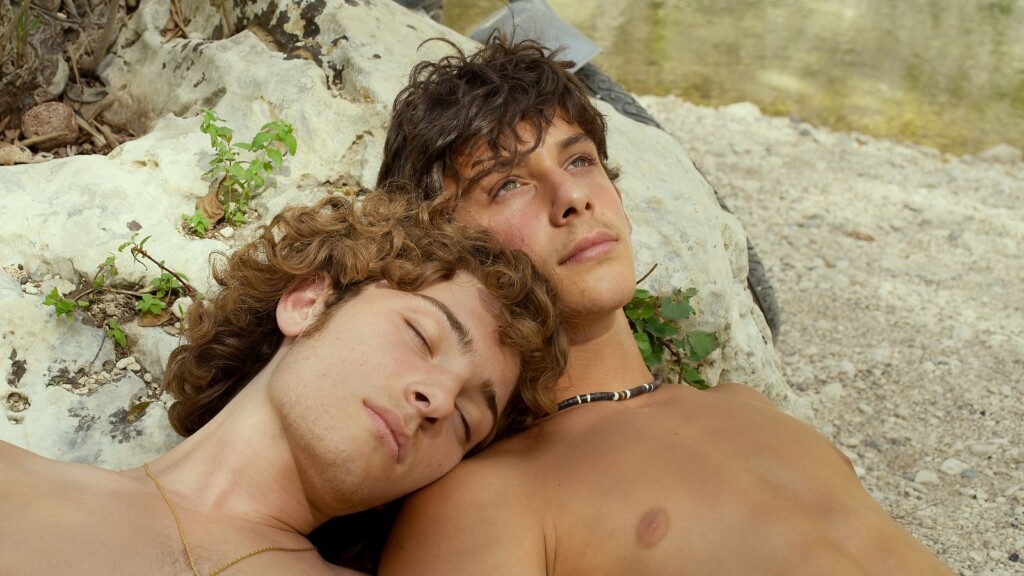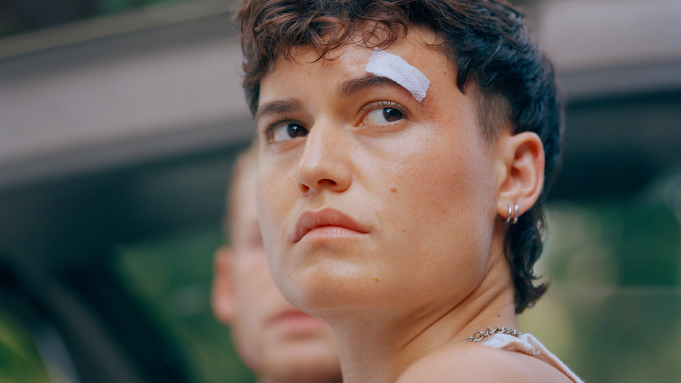EDITOR’S NOTE: This three-article package highlights the Utah Film Center’s Damn These Heels Queer Film Festival, which marks its 20th anniversary this year. The second feature is a detailed description of the festival’s slate and the third feature highlights two film workshops that are part of the festival.
When the Utah Film Center decided 20 years ago to launch its first Damn These Heels international queer film festival, the entertainment industry in general was coming around to expanding the presence of queer voices, stories and artistic achievements. Queer Eye for the Straight Guy premiered on the Bravo cable channel in 2003. Two years later, Brokeback Mountain hit the mainstream cinema, with Jake Gyllenhall and late Heath Ledger in the title roles. In the 2010s, film such as The Kids Are All Right, Pariah, Blue Is the Warmest Color and Tangerine drew international attention. Then, Moonlight, directed by Barry Jenkins, won the Academy Award for Best Picture in 2017 and a year later, the Chilean drama A Fantastic Woman took the Academy Award for Best Foreign Language Film. In 2018, no fewer than 14 films with queer-themes narratives screened at Cannes. Likewise, the Sundance Film Festival expanded the possibilities as well. Earlier this year, the documentary Kokomo City took two major festival film prizes at the international January film festival in Park City and Salt Lake City.
Having encompassed nearly the center’s lifespan, Damn These Heels signifies UFC’s customary sensitivity for programming in how it reflects the most current pulse on the most prominent issues concerning social and political awareness. As The Utah Review noted in 2015, the festival became “a milestone … in terms of validation and artistic maturity, especially in dealing with topics such as gender fluidity and the urgently relevant issues of intersectionality encompassing race, sexuality, gender identity and class.”
In its 20 years, Damn These Heels has paralleled an industry trend — a multi-layered, life-spanning, coming-of-age theme not just in the documentaries and narratives being presented but also in the sophisticated and artistic depth of LGBT cinema along with the long-game opportunity for achieving social justice across the spectrum.
The festival runs Oct.12-15 at the Rose Wagner Center for Performing Arts. Opening night (Oct. 12) features A Run for More (2022, Ray Whitehouse), which follows the campaign of Frankie Gonzales-Wolfe to become Texas’s first elected transgender legislator, running for a district seat in the San Antonio City Council. Frankie Gonzales-Wolfe ran for election to the San Antonio City Council to represent District 8 in Texas. Although Gonzales-Wolfe lost the 2019 election, the documentary offers a glimpse into the successes and failures of political campaign strategies. Presently, 50 elected legislative officials in the U.S. identify as either a trans man or trans woman, according to data from Out for America – LGBTQ+ Victory Institute.
Miss Coco Peru (Clinton Leupp) takes the stage on Friday (Oxt. 13) at 7 p.m. in the Jeanné Wagner Theater at the Rose Wagner Performing Arts Center. With more than 30 years of performance in her portfolio, Miss Coco starred in Trick, the 1999 indie film directed by Jim Fall which debuted at Sundance that year, and Girls Will Be Girls, the 2003 film directed by Richard Day, which will be screened during the festival. Following her performance, Miss Coco will host an audience-led Q&A discussing topics related to the LGBTQ+ community.
“Damn These Heels Queer Film Festival has come a long way since its humble beginnings, and we are immensely proud to reach this momentous 20th anniversary,” said Mariah Mellus, Utah Film Center executive director. “Our commitment to amplifying LGBTQ+ voices and stories remains unwavering, and this year’s lineup reflects the incredible diversity and joy our community offers. We invite everyone to join us in celebrating two decades of pushing boundaries, fostering inclusion, and making history through the art of cinema.”
In 2013, Damn These Heels was named as one of the ten most notable LGBT film festivals by IndieWire and that distinction has been replicated every year. The pool for the slate has expanded consistently. This year, more than 150 films were considered to build the slate of more than 20 feature-length films and 20 shorts. Russell Roots is the festival’s film exhibition director and Jade Velazquez serves as this year’s festival director who gathered a committee of community representatives to curate the film slate.
“It really stands out how Utah, a red state, is home to a film festival that is extraordinary for its communal significance,” Roots said in an interview with The Utah Review. “For marginalized communities, it is a never-ending struggle and the value of having accurate representation of stories that resonate with our audiences cannot be overestimated. We program this festival weekend to be like a harbor in the storm where audiences can truly be themselves and find their cultural touchstones.”
As the festival grew through the years, the Utah Film Center staff began traveling throughout the state in offering screenings of films that have been part of Damn These Heels. This year, a selection of films also will be available online, starting Oct. 15.
The 2023 offerings represent five local filmmakers, 17 female directors, 10 directors identifying as a person of color, and 14 countries represented. As it has become consistent from year to year, as The Utah Review has acknowledged previously, the films defy conventional genres and the comfort of complacency, potentially touching emotions and nerves among all members of the community, regardless of their sexual identities. There is an uncompromising candor — even sometimes brutish realism – in many of the stories, which will engender many different reactions but also will invigorate the spirit to carry the good fight forward, to discover love and find beauty in the most unexpected places, and to share a passion for thrilling cinematic storytelling.
The mix’s eclectic character is noteworthy for this year’s slate. The fictional narratives range from realism and slice-of-life stories to fantasy-laden parables and to experimental treatments underscoring the creative appeal of independent queer cinema. The documentaries have historical treatments and profiles emphasizing the broader themes of acceptance which are transforming the sociopolitical landscape.
Many filmmakers with Utah connections have been part of the festival throughout its history. An excellent example comes from 2018: Alaska Is A Drag, an award-winning comedy-drama which exudes entertaining fabulousness in Leo, a young man working in a Alaska fish cannery but whose ambitions are to become a famous drag performer. Directed by Shaz Bennett, who is from Salt Lake City but now lives in Los Angeles, the film was developed from a short of the same title, which screened in 2013 at Damn These Heels.
Among the Utah filmmakers represented this year is the feature-length Empty Orchestra (2023, Nicole Hawkins), which is set in Provo about a group of karaoke singers who meet weekly for a different community outlet for their devotion. The film premiered earlier this year at the Brooklyn Film Festival. Three shorts by Utah filmmakers are included in the slate: Amanda Madden’s A Spell for Queer Home, and two from last year’s PitchNic premieres at Spy Hop Productions: Hidden Pride by Fletcher Gibbons and Queen Bees by Riley Nickel.
Among the festival’s biggest prized offerings is Kokomo City (2023, D. Smith), which was picked up by Magnolia Pictures for release and distribution after its Sundance premiere in January. This 73-minute documentary gallops at a scintillating pace, weaving in the stories of four Black transgender sex workers, without moralizing judgment, sociopolitical commentary from experts, or cutaways to explain terms or for others to anchor the context of their unashamedly candid stories. Another Sundance premiere from this past January included in the slate is Mutt, directed by Vuk Lungulov-Klotz. The narrative feature is about Feña, a young trans guy in New York City who is afflicted with an incessantly challenging day that resurrects ghosts from his past.
At least 10 feature-length films have garnered major film festival awards, including 1946: The Mistranslation That Shifted Culture (2022, Sharon “Rocky” Roggio), a documentary about an erroneous translation of Biblical scripture that fueled anti-queer sentiments in religious communities; the coming-of-age comedy Big Boys (2023, Corey Sherman); Fireworks (2023, Italy, Giuseppe Fiorello), a story about a young gay couple in a small southern Italy town where their romance angers neighbors and Heels Over Wheels (2022, Spain, Pau Canivell), a documentary about a drag queen family traveling to a small town to support a student who has been bullied at school. Other award winners coming to Damn These Heels are Girls Will Be Girls (2003, Richard Day), Golden Delicious (2022, Canada, Jason Karman), Lie with Me (2023, France, Olivier Peyon) and The Sixth Reel (2021, Andress Carl & Charles Busch).
Among the six award-winning shorts screening at Damn These Heels are Aikāne (2023, Daniel Sousa, Dean Hamer, & Joe Wilson), with the title coming from Hawaiian culture which is an ancient term for intimate same-sex friends. The story is about an island warrior who ends up in in an underwater world after being wounded. Damn These Heels festival goers will remember that the creative team behind this project came to the festival in 2018 with Leitis in Waiting, a documentary about transgender individuals, their unique roles in Tongan culture, and the struggle for equal rights even though they were accepted by two mainstays of the island nation: the Catholic Church and the royal family.
From Alaska, Apayauq (2023, Zeppelin Zeerip) is a superb 16-minute documentary short about Apayauq Reitan, a dog musher who became the first out transgender woman to complete the Iditarod sled dog race and win the coveted Red Lantern Award. Other award-winning shorts featured this year are Dilating for Maximum Results (2023, Nyala Moon), Happy BirthGay (2022, Israel, Niv Manzur), Love, Barbara (2022, Brydie O’Connor) and Rooted (2022, Taiwan, Wu Yi-Wei).
The Utah Film Center’s Artist Foundry will host a series of workshops for filmmaking enthusiasts, offering the chance to develop story-telling skills with award-winning local Utah queer filmmakers. Workshops include hands-on instruction and tool development designed to teach technical and strategic skills while introducing opportunities for creative exploration.
Committed to making the Festival as inclusive as possible, a “pay what you can” pricing model is available to festival goers who can choose what to pay based on their financial circumstances.
For tickets and more information, see the Damn These Heels website.





